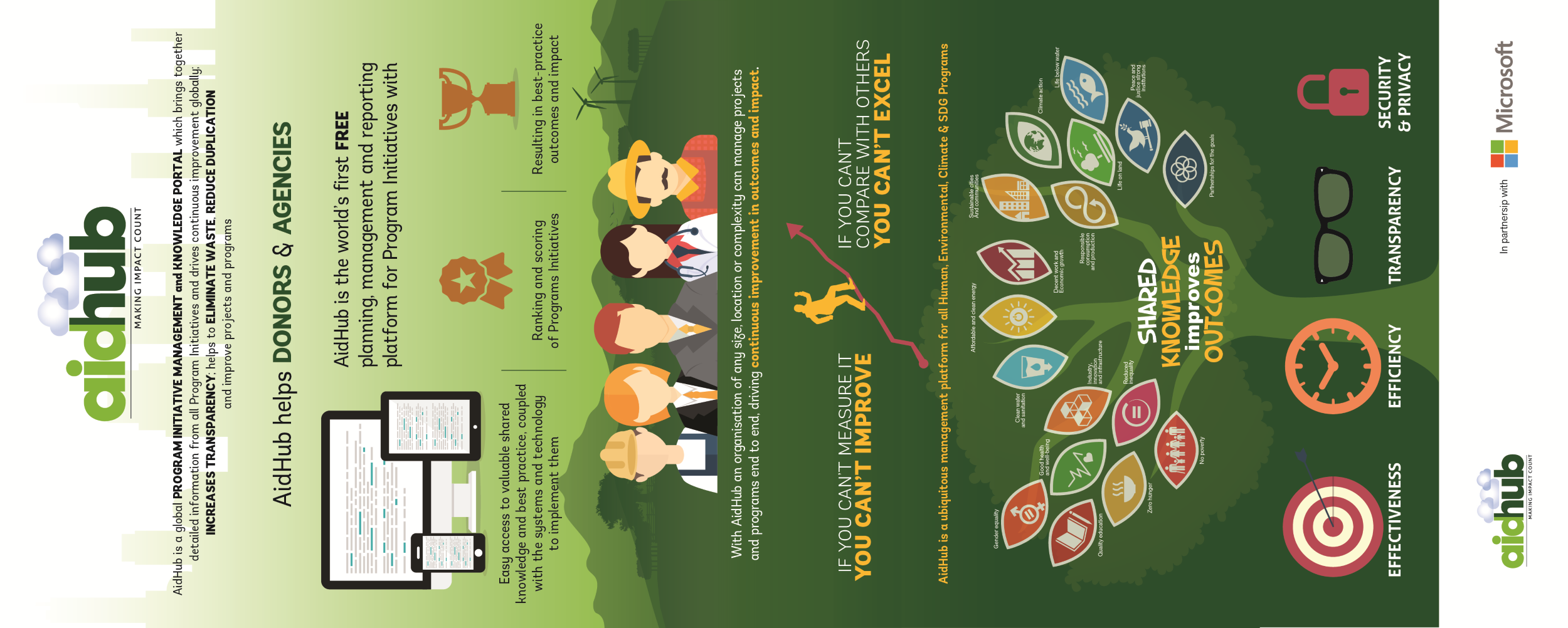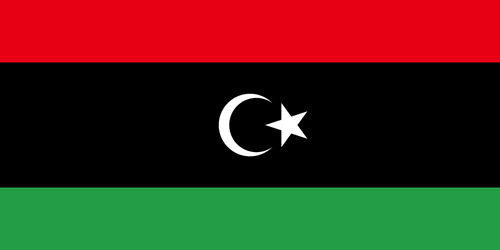AidHub.org - Global SDG Program Management, Collaboration & Knowledge Sharing Technology Platform
Description
While the technology platform of AidHub is currently in the development phase, once completed, tested and trialed, the global AidHub platform will be launched to all Aid/CSR/NGO free of charge internationally through a broad range of media such as, television, radio, print and online media.
AidHub’s world first technologies drives continual improvement and global collaboration between all Aid/CSR/NGO globally through largely automated functions in AidHub which showcase and push the highest ranked and scored “Best Practice” Program Initiative outcomes and Impact to other users in the AidHub platform. This Knowledge Push/Sharing/Transfer is specific and relevant to a given User's role or field of expertise, thus providing the global knowledge transfer of what works best for mankind and our planet. Driving month on month, year on year continual improvement which ensures faster, more effective and efficient outcomes and impact for all.We recognise that it is not enough to simply share greater knowledge. In order for any organisation to truly benefit from knowledge gained, it is equally important to have innovative technologies seamlessly coupled with that knowledge at every level. AidHub provides this coupled technology/knowledge solution at its core, better facilitating the use of the knowledge gained from the system in a way which is instrumental in achieving best outcomes.AidHub provides a powerful global platform for sharing knowledge, experiences, technological capabilities and best practices outcomes for all. We see this as a key factor of continuous improvement in the effectiveness and efficiency of all Program Initiative outcomes and impact.
AidHub International Ltd (AidHub), being a registered incorporated nonprofit public company in Australia. AidHub is registered with the Australian Securities and Investment Commission (ASIC) and has a registered and approved Constitution as a nonprofit corporation. AidHub has a board of Directors which currently exists of 3 members; however this is expanding over the next 4-8 weeks to include an additional 3-5 new directors. All directors are required to govern the nonprofit company in line with the company's registered Constitution. A copy of this constitution can be seen at http://aidhub.org/about-us/governance/
SDGS & Targets
Goal 17
Strengthen the means of implementation and revitalize the Global Partnership for Sustainable Development
17.1
Strengthen domestic resource mobilization, including through international support to developing countries, to improve domestic capacity for tax and other revenue collection
17.1.1
17.1.2
17.2
Developed countries to implement fully their official development assistance commitments, including the commitment by many developed countries to achieve the target of 0.7 per cent of ODA/GNI to developing countries and 0.15 to 0.20 per cent of ODA/GNI to least developed countries; ODA providers are encouraged to consider setting a target to provide at least 0.20 per cent of ODA/GNI to least developed countries
17.2.1
17.3
Mobilize additional financial resources for developing countries from multiple sources
17.3.1
Additional financial resources mobilized for developing countries from multiple sources
17.3.2
17.4
Assist developing countries in attaining long-term debt sustainability through coordinated policies aimed at fostering debt financing, debt relief and debt restructuring, as appropriate, and address the external debt of highly indebted poor countries to reduce debt distress
17.4.1
Debt service as a proportion of exports of goods, services and primary income
17.5
Adopt and implement investment promotion regimes for least developed countries
17.5.1
Number of countries that adopt and implement investment promotion regimes for developing countries, including the least developed countries
17.6
Enhance North-South, South-South and triangular regional and international cooperation on and access to science, technology and innovation and enhance knowledge sharing on mutually agreed terms, including through improved coordination among existing mechanisms, in particular at the United Nations level, and through a global technology facilitation mechanism
17.6.1
Fixed broadband subscriptions per 100 inhabitants, by speed
17.7
Promote the development, transfer, dissemination and diffusion of environmentally sound technologies to developing countries on favourable terms, including on concessional and preferential terms, as mutually agreed
17.7.1
Total amount of funding for developing and developed countries to promote the development, transfer, dissemination and diffusion of environmentally sound technologies
17.8
Fully operationalize the technology bank and science, technology and innovation capacity-building mechanism for least developed countries by 2017 and enhance the use of enabling technology, in particular information and communications technology
17.8.1
17.9
Enhance international support for implementing effective and targeted capacity-building in developing countries to support national plans to implement all the Sustainable Development Goals, including through North-South, South-South and triangular cooperation
17.9.1
Dollar value of official development assistance committed to developing countries
17.10
Promote a universal, rules-based, open, non-discriminatory and equitable multilateral trading system under the World Trade Organization, including through the conclusion of negotiations under its Doha Development Agenda
17.10.1
17.11
Significantly increase the exports of developing countries, in particular with a view to doubling the least developed countries’ share of global exports by 2020
17.11.1
Developing countries’ and least developed countries’ share of global exports
17.12
Realize timely implementation of duty-free and quota-free market access on a lasting basis for all least developed countries, consistent with World Trade Organization decisions, including by ensuring that preferential rules of origin applicable to imports from least developed countries are transparent and simple, and contribute to facilitating market access
17.12.1
Weighted average tariffs faced by developing countries, least developed countries and small island developing States
17.13
Enhance global macroeconomic stability, including through policy coordination and policy coherence
17.13.1
17.14
Enhance policy coherence for sustainable development
17.14.1
17.15
Respect each country’s policy space and leadership to establish and implement policies for poverty eradication and sustainable development
17.15.1
17.16
Enhance the Global Partnership for Sustainable Development, complemented by multi-stakeholder partnerships that mobilize and share knowledge, expertise, technology and financial resources, to support the achievement of the Sustainable Development Goals in all countries, in particular developing countries
17.16.1
Number of countries reporting progress in multi-stakeholder development effectiveness monitoring frameworks that support the achievement of the Sustainable Development Goals
17.17
Encourage and promote effective public, public-private and civil society partnerships, building on the experience and resourcing strategies of partnerships
17.17.1
Amount in United States dollars committed to public-private partnerships for infrastructure
17.18
By 2020, enhance capacity-building support to developing countries, including for least developed countries and small island developing States, to increase significantly the availability of high-quality, timely and reliable data disaggregated by income, gender, age, race, ethnicity, migratory status, disability, geographic location and other characteristics relevant in national contexts
17.18.1
Statistical capacity indicators
17.18.2
17.18.3
Number of countries with a national statistical plan that is fully funded and under implementation, by source of funding
17.19
By 2030, build on existing initiatives to develop measurements of progress on sustainable development that complement gross domestic product, and support statistical capacity-building in developing countries
17.19.1
17.19.2
Proportion of countries that (a) have conducted at least one population and housing census in the last 10 years; and (b) have achieved 100 per cent birth registration and 80 per cent death registration
SDG 14 targets covered
| Name | Description |
|---|---|
| 17.14 | Enhance policy coherence for sustainable development |
Deliverables & Timeline
Resources mobilized
Partnership Progress

Feedback

Timeline
Entity
SDGs
Geographical coverage
More information
Countries



















Contact Information
Alan Morgan, Founder
